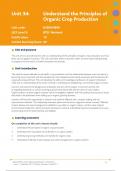Tentamen (uitwerkingen)
Principles of Organic Crop Production
Vak
Organic Crop Production
Instelling
Organic Crop Production
Unit 34: Understand the Principles of
Organic Crop Production
Unit code: D/600/9849
QCF Level 3: BTEC National
Credit value: 10
Guided learning hours: 60
Aim and purpose
This unit aims to provide learners with an understanding of the principles of organic crop production and how
these can...
[Meer zien]
Voorbeeld 2 van de 12 pagina's
Geupload op
29 juli 2024
Aantal pagina's
12
Geschreven in
2023/2024
Type
Tentamen (uitwerkingen)
Bevat
Vragen en antwoorden
organic
organic crop production
Instelling
Organic Crop Production
Vak
Organic Crop Production
€8,76
100% tevredenheidsgarantie
Direct beschikbaar na betaling
Zowel online als in PDF
Je zit nergens aan vast
Edexcel BTEC Level 3 Nationals specification in Horticulture





